Remembering to exercise regularly is wonderful for your overall well-being, but what do scalp sweats do to your hair follicles? Can your sweat glands support healthy hair growth, or will excessive sweating lead to unpleasant buildup and irritated skin?
We consulted with an expert to get to the bottom of the sweat question. Here's what she said about how that sweaty workout may be impacting your strands — plus, find out about the must-have products you need to support thicker, fuller and healthier looking hair.
How Sweat Glands Support Your Hair
Let's start with the caveat that wanting to avoid sweat is no reason to cut down on regular exercise! Even if you get a little sweaty, elevating your heart rate through routine exercise is great for your health. It helps to delay the onset of more than 40 chronic conditions or diseases and can also positively impact your mental health.
Additionally, getting sweaty might actually be a useful tool in natural hair care. Certified dermatologist Dr. Alpana Mohta said that the question of whether sweat is good or bad for your hair shaft depends on a few factors. "If you have healthy hair, sweat shouldn't cause any damage," she said. "In fact, it can actually help to keep your scalp and hair hydrated."
Elevating your heart rate and body temperature to get a little sweaty unclogs dirty pores, including clogged follicles, which helps eliminate unhealthy bacteria and built-up grime. The sweat glands on your head are closely interlinked with your hair follicles, so when your sweat glands are flowing, the pores in your scalp might open, freeing any buildup that might have accumulated and clearing the way for the natural oils your scalp produces to support hair health. Under the right conditions, you might say a good sweat can be your scalp's best friend.
Shop: GRO Collection for Thicker, Fuller Looking Hair
The Downsides of Sweaty Strands
However, just because sweat has healthful properties doesn't mean that it's harmless. According to Dr. Mohta, it can be particularly damaging to people with certain scalp conditions or hair types.
"If you have any kind of scalp condition, such as dandruff, eczema or psoriasis, sweat can make it worse," she said. This includes all kinds of scalp conditions, including flakiness, dryness or fungal infections, so if your scalp is suffering, sweat might make it worse. In these cases, it might be worth taking an exercise break until your condition clears up or at least taking steps to keep sweating to a minimum.
Sweat can also affect your strands differently depending on hair type. "If you have oily hair, sweat can help to remove some of the excess oil," said Dr. Mohta. "However, if your hair is already dry, sweat can further strip it of moisture and lead to breakage. Sweat can also harm colored hair. When sweat evaporates, it leaves a layer of salt on your scalp and hair that can damage colored hair. While working out, if the sweat keeps trickling down your hair, it can lead to hair breakage, as wet hair breaks easily than dry." This is especially true if you like to work in a hair-damaging style like a tight bun or high pony, which are particularly prone to sweat-induced breakage.
Before you vow never to get a sweaty scalp again, know that sweating is a normal body function that's mostly water. To be exact, sweat consists of 99% water; the other 1% is salt and fat.
"On its own, sweat doesn't damage your hair," explained Dr. Mohta. "But if you leave your sweaty hair to dry, it can clog the pores on your scalp and make it prone to acquiring infections."
Also: Hair Feeling Greasy or Oily? Try This
How to Care for Sweaty Hair
So what's the best way to care for sweaty hair? According to Dr. Mohta, preventing sweat buildup is a key preventative measure you should take.
During exercise, while the sweat is flowing, you should use a cotton headband to absorb sweat. If you tie your hair up, replace your elastics with a more gentle method like a clip or fabric-covered hair ties to protect hair from breakage.
After exercising, Dr. Mohta recommends you wash your hair to get rid of sweat before it can cause any potential damage. "The best way to care for your hair when it's sweaty is to rinse it as soon as possible after exercise," she said. "You can use a gentle shampoo if necessary, but make sure to follow up with a conditioner to help replace lost moisture. If you have time, you can also give your hair a quick rinse with cool water before shampooing to help close the cuticle and prevent damage."
If you exercise frequently but avoid washing your hair too often, using a dry shampoo designed to support hair and scalp health is a great way to prevent any potential sweat damage without compromising your wash day schedule. And when wash day rolls around, make sure to use a scalp detoxifying scrub packed with nourishing ingredients to clear your hair follicles. Additionally, apply a protective product like a leave-in conditioner or argan oil to help protect strands for the next time you get physical.
See: How to Use Dry Shampoo to Get Clean Hair Between Washes
Sweat and Hair Health: The Bottom Line
We might all dream of having perfect, sweat-free strands wherever we go, but at the end of the day, you shouldn't cut down on exercise or other fun, sweaty activities because of the potential sweat damage they may cause.
Sweat is part of your body's natural processes for keeping your hair healthy and your follicles clear, so don't be afraid to hit the dance floor, run that mile or take that hot yoga class out of concern for your strands! Just make sure to wash up when the fun is over.
#include-related-slider#
More From VEGAMOUR
- Shop: Our Favorite Scalp Care Products
- How Often Should You Really Be Washing Your Hair?
- How to Exfoliate Your Scalp for Healthier Hair
- Ingredients to Avoid in Shampoo — And What to Look for Instead
Photo credit: Ketut Subiyanto/Pexels




















